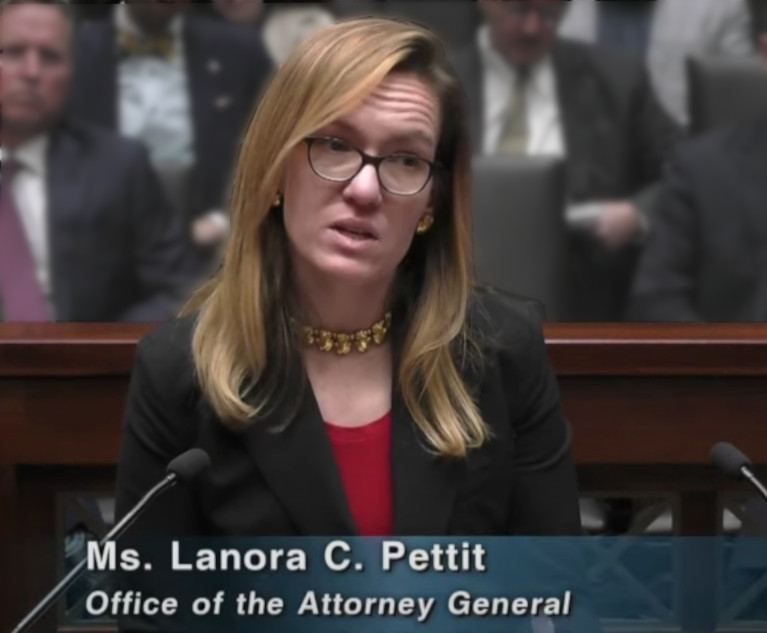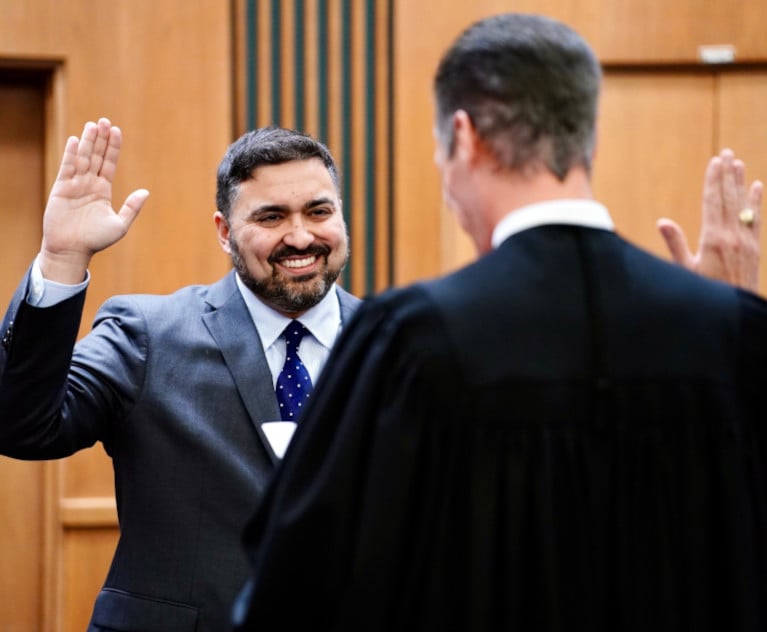Texas Judges Are Suing the Governor Over No-Money Bonds During COVID-19 Pandemic
In a separation-of-powers dispute between the judiciary and executive branches, 16 Houston judges have alleged that Texas Gov. Greg Abbott stripped them of discretion to grant personal recognizance bonds to certain criminal-defendants.
April 13, 2020 at 02:06 PM
5 minute read
 Photo: Jason Doiy/ALM
Photo: Jason Doiy/ALM
The COVID-19 pandemic has created a separation-of-powers dispute between the judiciary and executive branches of Texas government.
And now the Texas Supreme Court is involved.
The dispute centers around an emergency order that Gov. Greg Abbott issued March 29. The order prohibited judges from granting nonmonetary personal-recognizance bonds, which release defendants without deposit or collateral. It prevents judges from releasing defendants charged with violent crimes, or those with violent criminal histories, among other things. The judges can still release those defendants for medical or health reasons.
On one hand, a group of 16 Houston judges and some lawyer organizations argued that the order strips judges of discretion. They argue the governor acted outside of his authority in issuing it, and he violated separation of powers. They sued Abbott and Texas Attorney General Ken Paxton.
But on the other side, the defendants argue they have broad authority to respond to the pandemic by suspending laws that interfere in the response, and that the judiciary should not second-guess the governor's actions.
'Unsubstantiated fear'
The case is moving fast.
Judge Lora Livingston of the 261st District in Austin granted a temporary restraining order April 10, explaining in a letter ruling that the court respects the government's interests and powers to manage challenges during the disaster. She determined that Abbott's emergency order stripped judges of their discretion, and might have subjected them to mandamus or criminal actions.
"The order appears to address an unsubstantiated fear that the judges of the state will abandon their legal obligation to balance the interests of the public, individuals accused, but not convicted of criminal offenses, and the victims of those alleged offenses," Livingston wrote. "This exercise of judicial discretion falls squarely within the purview of the judicial branch of our government."
Plaintiffs attorney Andre Segura said in a statement that he's pleased that the trial court granted the temporary restraining order.
"The governor has an important role to play in responding to this pandemic, but the governor cannot impede the ability of judges to use their discretion to release particular individuals, especially when lives are at risk," Segura said.
But the Texas Supreme Court on April 11 stayed the temporary restraining order because the government filed a petition for writ of mandamus.
Paxton said in a statement he's thankful to the Supreme Court.
"A health crisis cannot stop the need for justice, and the district court's decision directly endangered the public," said Paxton. "We must all work together, including our justice system, to successfully protect our communities."
Plaintiffs' position
In the original petition, the plaintiffs claimed that counties across Texas are working to reduce jail populations because of the high risk of infection in detention. Abbott's order frustrated those efforts and unlawfully undercut judges' authority, alleged the petition in Texas Criminal Defense Lawyers Association v. Abbott, filed in Travis County district court.
The plaintiff-judges seek declaratory relief, alleging the governor violated separation-of-powers provisions. They argue the court should find the governor's order null and void because Abbott acted allegedly outside his authority.
"The Disaster Act does not permit the governor to suspend substantive provisions of criminal law," the petition said, alleging that the act only allows Abbott to suspend regulations of the executive branch.
The judges claimed they're harmed because they can't use their judicial authority, and must pick between following Texas law and the Constitution, or following Abbott's order.
The legal groups added that criminal-defense attorneys are putting themselves in harm's way to visit clients in jail to obtain signatures on emergency writs and petitions.
Mandamus petition
The defendants disagree.
Their court filing on April 10 argues judges are misusing personal bonds out of a well-intentioned but misguided effort to release even dangerous felons from jail during the pandemic.
Abbott and the other defendants claimed that under the plaintiffs' interpretation of the Disaster Act, Abbott would have to run to the legislature each time his emergency orders touch on a Texas statute.
"The legislature has vested the governor with both the responsibility and the authority to protect citizens in a time of crisis," the answer said. "There is over a century's worth of binding and persuasive cases cautioning that the judiciary should not second-guess the executive's responses during a public health emergency."
The defendants' filing with the Texas Supreme Court, in addition to raising arguments about jurisdiction and sovereign immunity, argued that Abbott does have authority under the disaster act to take the actions in the emergency order that restricted bond.
"Plaintifs' interpretation would curtail the state's ability to respond effectively to major disasters like the current pandemic," the mandamus petition said. "If the law thwarts or diminishes the government's ability to mitigate the disaster, the governor may suspend it."
Related story:
Safety Versus Liberty: Litigators Push for Constitutional Rights Amid COVID-19 Restrictions
This content has been archived. It is available through our partners, LexisNexis® and Bloomberg Law.
To view this content, please continue to their sites.
Not a Lexis Subscriber?
Subscribe Now
Not a Bloomberg Law Subscriber?
Subscribe Now
NOT FOR REPRINT
© 2025 ALM Global, LLC, All Rights Reserved. Request academic re-use from www.copyright.com. All other uses, submit a request to [email protected]. For more information visit Asset & Logo Licensing.
You Might Like
View All


Trending Stories
- 1States Accuse Trump of Thwarting Court's Funding Restoration Order
- 2Microsoft Becomes Latest Tech Company to Face Claims of Stealing Marketing Commissions From Influencers
- 3Coral Gables Attorney Busted for Stalking Lawyer
- 4Trump's DOJ Delays Releasing Jan. 6 FBI Agents List Under Consent Order
- 5Securities Report Says That 2024 Settlements Passed a Total of $5.2B
Who Got The Work
J. Brugh Lower of Gibbons has entered an appearance for industrial equipment supplier Devco Corporation in a pending trademark infringement lawsuit. The suit, accusing the defendant of selling knock-off Graco products, was filed Dec. 18 in New Jersey District Court by Rivkin Radler on behalf of Graco Inc. and Graco Minnesota. The case, assigned to U.S. District Judge Zahid N. Quraishi, is 3:24-cv-11294, Graco Inc. et al v. Devco Corporation.
Who Got The Work
Rebecca Maller-Stein and Kent A. Yalowitz of Arnold & Porter Kaye Scholer have entered their appearances for Hanaco Venture Capital and its executives, Lior Prosor and David Frankel, in a pending securities lawsuit. The action, filed on Dec. 24 in New York Southern District Court by Zell, Aron & Co. on behalf of Goldeneye Advisors, accuses the defendants of negligently and fraudulently managing the plaintiff's $1 million investment. The case, assigned to U.S. District Judge Vernon S. Broderick, is 1:24-cv-09918, Goldeneye Advisors, LLC v. Hanaco Venture Capital, Ltd. et al.
Who Got The Work
Attorneys from A&O Shearman has stepped in as defense counsel for Toronto-Dominion Bank and other defendants in a pending securities class action. The suit, filed Dec. 11 in New York Southern District Court by Bleichmar Fonti & Auld, accuses the defendants of concealing the bank's 'pervasive' deficiencies in regards to its compliance with the Bank Secrecy Act and the quality of its anti-money laundering controls. The case, assigned to U.S. District Judge Arun Subramanian, is 1:24-cv-09445, Gonzalez v. The Toronto-Dominion Bank et al.
Who Got The Work
Crown Castle International, a Pennsylvania company providing shared communications infrastructure, has turned to Luke D. Wolf of Gordon Rees Scully Mansukhani to fend off a pending breach-of-contract lawsuit. The court action, filed Nov. 25 in Michigan Eastern District Court by Hooper Hathaway PC on behalf of The Town Residences LLC, accuses Crown Castle of failing to transfer approximately $30,000 in utility payments from T-Mobile in breach of a roof-top lease and assignment agreement. The case, assigned to U.S. District Judge Susan K. Declercq, is 2:24-cv-13131, The Town Residences LLC v. T-Mobile US, Inc. et al.
Who Got The Work
Wilfred P. Coronato and Daniel M. Schwartz of McCarter & English have stepped in as defense counsel to Electrolux Home Products Inc. in a pending product liability lawsuit. The court action, filed Nov. 26 in New York Eastern District Court by Poulos Lopiccolo PC and Nagel Rice LLP on behalf of David Stern, alleges that the defendant's refrigerators’ drawers and shelving repeatedly break and fall apart within months after purchase. The case, assigned to U.S. District Judge Joan M. Azrack, is 2:24-cv-08204, Stern v. Electrolux Home Products, Inc.
Featured Firms
Law Offices of Gary Martin Hays & Associates, P.C.
(470) 294-1674
Law Offices of Mark E. Salomone
(857) 444-6468
Smith & Hassler
(713) 739-1250







